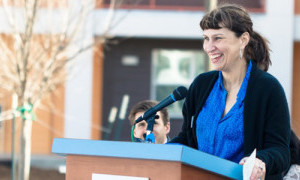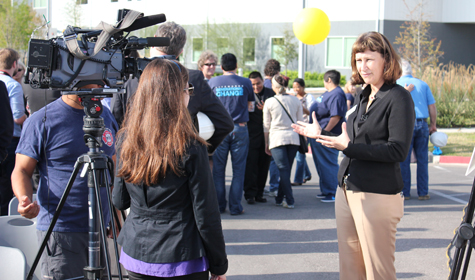
This profile marks the beginning of a series of interviews with Leadership Austin alumni. Join us here regularly to learn more about the people—equipped with their Leadership Austin experience—impacting our community.
—–
Sometimes passionate people can overwhelm a room with their intensity, but Susan McDowell manages to fill the space with enough warmth and humility that there is still plenty of oxygen for everyone else. Her ambition and drive are certainly palpable, but it’s clear Susan’s energy is fueled by compassion, not ego. This mindset has served her well in her 13-year position as executive director of LifeWorks.
LifeWorks is a youth and family services organization in Austin that focuses on building self-sufficiency for people facing issues such as homelessness, abuse, poverty and emancipation from foster care.
Susan has been active in countless civic organizations and initiatives and currently serves on the boards of Children’s Optimal Health, Spirit Reins and ECHO. Among the many acknowledgements she has received, Susan has been awarded “Austinite (Under 40) of the Year” by the Young Men’s Business League and Young Women’s Alliance, “Central Texas Social Entrepreneur of the Year” by Ernst and Young, and “Best Community Visionary” by the Austin Chronicle.
Born and raised in Knoxville, Tennessee, Susan received a B.A. in Philosophy from Vanderbilt University, and then came to The University of Texas at Austin to earn her M.A., also in Philosophy. She was working for an Austin nonprofit when she joined Leadership Austin’s Essential Class of 1998, which she proudly explains served as midwife to the growing idea of the LifeWorks organization.
Leadership Austin: Tell me about the founding of LifeWorks…
Susan McDowell: The creation of LifeWorks is in many ways a Leadership Austin baby. There were four organizations that were exploring merging our organizations into one. We started those discussions in late 1996, early 1997. At the time, these four organizations were all focused on providing services and support to youth and to families, but in different ways. We began to realize that we were serving a lot of the same clients. We thought perhaps there was a better way to provide theses services, and that perhaps a new organization or collaboration would be more efficient and lead the organizations to greater sustainability.
We had been having exploring conversations in 1997. And then lo and behold, for the 1997-98 Essential class, three of us were accepted into that class. Lynn Sherman, Judith Manriquez and I were all there.
Our class had the opportunity early on in our Leadership Austin experience to develop and pitch year-long projects focused on the community. The idea was that the class would vote and choose three or four and then everyone would sign up to a team dedicated to them. So when we decided to pitch the merger as a leadership- and community-based initiative, we wanted the brain power of Leadership Austin. It was chosen as one project and we had a team of 15 or so classmates to help develop this idea. I like to say that the idea of LifeWorks was conceived before we began our Essential class, but the labor and delivery of the organization happened during our Leadership Austin year.
LA: What did LifeWorks gain from your Essential classmates?
 SM: One of things that they specifically helped us with was developing a way to communicate to the rest of the community why it was important that the four organizations join together. We wanted to find a way to make it very clear to community leadership that the people who often come in for social services have very complicated problems and that if they had greater access to a wide range of services then we could be more effective and efficient in helping them. The Leadership Austin process synthesized a way for us to communicate that idea. And our classmates helped us situate LifeWorks as a project that could be owned by the community, not just be a benefit to the community.
SM: One of things that they specifically helped us with was developing a way to communicate to the rest of the community why it was important that the four organizations join together. We wanted to find a way to make it very clear to community leadership that the people who often come in for social services have very complicated problems and that if they had greater access to a wide range of services then we could be more effective and efficient in helping them. The Leadership Austin process synthesized a way for us to communicate that idea. And our classmates helped us situate LifeWorks as a project that could be owned by the community, not just be a benefit to the community.
Through this process our classmates also became invested and supportive of the idea. They became longtime champions of LifeWorks.
LA: What lessons from Leadership Austin have stuck with you over the years?
SM: Leadership Austin gives you a 360-degree perspective. They provide cross-sector feedback and an incomparable diversity of leadership and community focus. I don’t think anyone is doing it better.
The biggest and still ongoing gain from Leadership Austin is that it provided me with a brain trust of reliable, interesting people who are making an impact on our community. We are all mutual champions of each others’ work.
But it also works both ways. You have people who are supportive and you can count on them being a part of your team, but it’s also where you go when you need to hear a hard truth or get critical feedback. That’s part of the Leadership Austin process as well: asking the hard questions, being truthful and critical in a helpful way. Nobody is going to jump in and be blindly supportive of a naive or overly ambitious idea. The mindset is “How can we make this work on behalf of the community?”
That could involve a lot of difficult conversations but the trust is there. And we don’t often get that in life. People want to avoid conflict and they are scared of hurting feelings. Leadership Austin offers a safe space for support but also for rigorous analysis and conversation.
LA: What makes a good leader?
SM: Someone who is willing to sometimes sit back and learn. Someone who can put him or herself in a place of curiosity and listening. People who position themselves as being of service. Who can shoulder a large amount of accountability and the ability to make hard decisions. I heard this quote somewhere, although I can’t remember who said it… “A good leader grows through their leadership. A bad leader swells in their leadership.” I keep it in the forefront of my mind. You should be continually challenging and growing yourself. This is not about you and how accomplished you are. When you lose that sense of curiosity and gratitude, then you aren’t in a good place as a leader.

LA: How would you describe your leadership style?
SM: I’m analytical. I seek out lots of data and feedback but ultimately I’m accountable for the decisions made by the organization. I also try to create a space to make sure that all voices are heard. And not just the folks who are naturally bent toward confidence or self-expression. I owe a lot of that to Leadership Austin. Even though we had a lot of outgoing, “ENTJ personality” types, we had folks who were with grassroots organizations, attorneys, physicians, people from pockets of life and professions that you wouldn’t run into every day. Working with this variety insists you sit back and listen and learn. I think the biggest leadership lesson I’ve learned so far: many, many styles of leadership can get the job done.
LA: Have you always been drawn to service organizations?
SM: Yes, always. From my undergraduate studies, on to my work with literacy groups in graduate school. And I have never regretted the Philosophy degrees. My masters degree has served me very well. I’m a big proponent of a Liberal Arts education. You learn very high-level analytic skills, you learn to write, you learn to think critically and always be in a place of learning and curiosity. I can’t think of a single profession where that is not essential.
LA: Looking back at where you were when you started this journey with LifeWorks, where did you think it would lead you?
You should be continually challenging and growing yourself. This is not about you and how accomplished you are. When you lose that sense of curiosity and gratitude, then you aren’t in a good place as a leader.SM: We had no idea what was in it for us. The decision to merge organizations was not driven by careers. We took our egos out of the equation and believed that it was bigger than us. We all knew we couldn’t all be top dog and that was OK. In fact we hired an outside CEO, and I didn’t take on the executive director role until three years later.
I’ve always been more driven by opportunities to learn and grow, and by community goals. At every stage of developing LifeWorks we were thinking, “Ok what can we do better? What is the next big thing we are going to push forward to be of service to the community?”
And when you’re in a culture that shares that motivation, thinking of personal ambitions and positions can easily fall by the wayside. Never underestimate the power of the shared collective vision. It really cuts through personal motivations.
LA: Is there anything about LifeWorks that people might not know?
SM: People are often overwhelmed by the number of services and programs we have under our umbrella, but they may not know that they are all focused on a single goal: measurable increases in self-sufficiency. So whether someone is coming into our GED program or our counseling program, for example, every single program is focused on that one goal.
LA: Any advice for Austin leaders?
SM: For rising leaders: Don’t think about the money. Figure out what you’re passionate about and throw yourself into it. That will get you where you’re supposed to be.
For established leaders: Reconnect with your early passions, or ask anew…“What do I want to learn?” Be open to a new set of experiences. Listen to millennials. Continue to develop ourselves and continue to be grateful. Our leadership positions are not rewards. They are earned and re-earned every single day.
—–
For more information about LifeWorks visit www.LifeWorksAustin.org.
